Fast Facts
- When: 23rd March 2023 to 14th July 2024
- Where: Various stadiums
- Watch: Channel 4, Viaplay & S4C
- Official Website: UEFA Euro 2024
The UEFA European Championship (The Euros) is one of the pinnacles of the international football calendar. As you’ve probably guessed, the tournament is run specifically for members and countries within the Union of European Football Associations (UEFA), which then decides who is the best team within Europe.
The tournament is run every four years with the finals held during the otherwise football deprived summer, giving a welcome injection of fixtures to spice up the off season. This is a high profile tournament which should have us sitting with offers up to our ears.
Existing Customer Free Bets & Money Back Offers
Get your single bets paid out if the team you back goes 2 goals ahead - for multiple bets the selection will be marked as a winner with bet365. Applies to pre-match single and multiple bets on the standard Full Time Result market for applicable competitions. Only available to new and eligible customers.
Stats Articles
- How Often Has the Reigning Winner of the Euros Won the World Cup?
- Has Any Team Won Back-To-Back European Championships?
- How Often Have the Reigning FIFA World Cup Winners Won The Euros?
- How Many Times Have The Hosts Won The Euros?
Euro 2024: Group Stage – Matchday 1
Friday 14th June
- 20:00 Germany v Scotland
Saturday 15th June
- 14:00 Hungary v Switzerland
- 17:00 Spain v Croatia
- 20:00 Italy v Albania
Sunday 16th June
- 14:00 Poland v Netherlands
- 17:00 Slovenia v Denmark
- 20:00 Serbia v England
Monday 17th June
- 14:00 Romania v Ukraine
- 17:00 Belgium v Slovakia
- 20:00 Austria v France
Tuesday 18th June
- 17:00 Turkey v Georgia
- 20:00 Portugal v Czech Republic
Event Stats
Qualifying Group A
| Pos. | Team | Played | Won | Draw | Lost | GF | GA | GD | Pts |
|---|---|---|---|---|---|---|---|---|---|
| 1 | Spain (Q) | 8 | 7 | 0 | 1 | 25 | 5 | 20 | 21 |
| 2 | Scotland (Q) | 8 | 5 | 2 | 1 | 17 | 8 | 9 | 17 |
| 3 | Norway | 8 | 3 | 2 | 3 | 14 | 12 | 2 | 11 |
| 4 | Georgia (PO) | 8 | 2 | 2 | 4 | 12 | 18 | -6 | 8 |
| 5 | Cyprus | 8 | 0 | 0 | 8 | 3 | 28 | −25 | 0 |
Qualifying Group B
| Pos. | Team | Played | Won | Draw | Lost | GF | GA | GD | Pts |
|---|---|---|---|---|---|---|---|---|---|
| 1 | France (Q) | 8 | 7 | 1 | 0 | 29 | 3 | 26 | 22 |
| 2 | Netherlands (Q) | 8 | 6 | 0 | 2 | 17 | 7 | 10 | 18 |
| 3 | Greece (PO) | 8 | 4 | 1 | 3 | 14 | 8 | 6 | 13 |
| 4 | Republic of Ireland | 8 | 2 | 0 | 6 | 9 | 10 | -1 | 6 |
| 5 | Gibraltar | 8 | 0 | 0 | 8 | 0 | 41 | −41 | 0 |
Qualifying Group C
| Pos. | Team | Played | Won | Draw | Lost | GF | GA | GD | Pts |
|---|---|---|---|---|---|---|---|---|---|
| 1 | England (Q) | 8 | 6 | 2 | 0 | 22 | 4 | 18 | 20 |
| 2 | Italy (Q) | 8 | 4 | 2 | 2 | 16 | 9 | 7 | 14 |
| 3 | Ukraine (PO) | 8 | 4 | 2 | 2 | 11 | 8 | 3 | 14 |
| 4 | North Macedonia | 8 | 2 | 2 | 4 | 10 | 20 | -10 | 8 |
| 5 | Malta | 8 | 0 | 0 | 8 | 2 | 20 | −18 | 0 |
Qualifying Group D
| Pos. | Team | Played | Won | Draw | Lost | GF | GA | GD | Pts |
|---|---|---|---|---|---|---|---|---|---|
| 1 | Turkey (Q) | 8 | 5 | 2 | 1 | 14 | 7 | 7 | 17 |
| 2 | Croatia (Q) | 8 | 5 | 1 | 2 | 13 | 4 | 9 | 16 |
| 3 | Wales (PO) | 8 | 3 | 3 | 2 | 10 | 10 | 0 | 12 |
| 4 | Armenia | 8 | 2 | 2 | 4 | 9 | 11 | -2 | 8 |
| 5 | Latvia | 8 | 1 | 0 | 7 | 5 | 19 | −14 | 3 |
Qualifying Group E
| Pos. | Team | Played | Won | Draw | Lost | GF | GA | GD | Pts |
|---|---|---|---|---|---|---|---|---|---|
| 1 | Albania (Q) | 8 | 4 | 3 | 1 | 12 | 4 | 8 | 15 |
| 2 | Czech Republic (Q) | 8 | 4 | 3 | 1 | 12 | 6 | 6 | 15 |
| 3 | Poland (PO) | 8 | 3 | 2 | 3 | 10 | 10 | 0 | 11 |
| 4 | Moldova | 8 | 2 | 4 | 2 | 7 | 10 | -3 | 10 |
| 5 | Faroe Islands | 8 | 0 | 2 | 6 | 2 | 13 | −11 | 2 |
Qualifying Group F
| Pos. | Team | Played | Won | Draw | Lost | GF | GA | GD | Pts |
|---|---|---|---|---|---|---|---|---|---|
| 1 | Belgium (Q) | 8 | 6 | 2 | 0 | 22 | 4 | 18 | 20 |
| 2 | Austria (Q) | 8 | 6 | 1 | 1 | 17 | 7 | 10 | 19 |
| 3 | Sweden | 8 | 3 | 1 | 4 | 14 | 12 | 2 | 10 |
| 4 | Azerbaijan | 8 | 2 | 1 | 5 | 7 | 17 | −10 | 7 |
| 5 | Estonia (PO) | 8 | 0 | 1 | 7 | 2 | 22 | −20 | 1 |
Qualifying Group G
| Pos. | Team | Played | Won | Draw | Lost | GF | GA | GD | Pts |
|---|---|---|---|---|---|---|---|---|---|
| 1 | Hungary (Q) | 8 | 5 | 3 | 0 | 16 | 7 | 9 | 18 |
| 2 | Serbia (Q) | 8 | 4 | 2 | 2 | 15 | 9 | 6 | 14 |
| 3 | Montenegro | 8 | 3 | 2 | 3 | 9 | 11 | -2 | 11 |
| 4 | Lithuania | 8 | 1 | 3 | 4 | 8 | 14 | −6 | 6 |
| 5 | Bulgaria | 8 | 0 | 4 | 4 | 7 | 14 | −7 | 4 |
Qualifying Group H
| Pos. | Team | Played | Won | Draw | Lost | GF | GA | GD | Pts |
|---|---|---|---|---|---|---|---|---|---|
| 1 | Denmark (Q) | 10 | 7 | 1 | 2 | 19 | 10 | 9 | 22 |
| 2 | Slovenia (Q) | 10 | 7 | 1 | 2 | 20 | 9 | 11 | 22 |
| 3 | Finland (PO) | 10 | 6 | 0 | 4 | 18 | 10 | 8 | 18 |
| 4 | Kazakhstan (PO) | 10 | 6 | 0 | 4 | 16 | 12 | 4 | 18 |
| 5 | Northern Ireland | 10 | 3 | 0 | 7 | 9 | 13 | -4 | 9 |
| 6 | San Marino | 10 | 0 | 0 | 10 | 3 | 31 | −28 | 0 |
Qualifying Group I
| Pos. | Team | Played | Won | Draw | Lost | GF | GA | GD | Pts |
|---|---|---|---|---|---|---|---|---|---|
| 1 | Romania (Q) | 10 | 6 | 4 | 0 | 16 | 5 | 11 | 22 |
| 2 | Switzerland (Q) | 10 | 4 | 5 | 1 | 22 | 11 | 11 | 17 |
| 3 | Israel (PO) | 10 | 4 | 3 | 3 | 11 | 11 | 0 | 15 |
| 4 | Belarus | 10 | 3 | 3 | 4 | 9 | 14 | −5 | 12 |
| 5 | Kosovo | 10 | 2 | 5 | 3 | 10 | 10 | 0 | 11 |
| 6 | Andorra | 10 | 0 | 2 | 8 | 3 | 20 | −17 | 2 |
Qualifying Group J
| Pos. | Team | Played | Won | Draw | Lost | GF | GA | GD | Pts |
|---|---|---|---|---|---|---|---|---|---|
| 1 | Portugal (Q) | 10 | 10 | 0 | 0 | 36 | 2 | 34 | 30 |
| 2 | Slovakia (Q) | 10 | 7 | 1 | 2 | 17 | 8 | 9 | 22 |
| 3 | Luxembourg (PO) | 10 | 5 | 2 | 3 | 13 | 19 | −6 | 17 |
| 4 | Iceland (PO) | 10 | 3 | 1 | 6 | 17 | 16 | 1 | 10 |
| 5 | Bosnia and Herzegovina (PO) | 10 | 3 | 0 | 7 | 9 | 20 | −11 | 9 |
| 6 | Liechtenstein | 10 | 0 | 0 | 10 | 1 | 28 | −27 | 0 |
Schedule
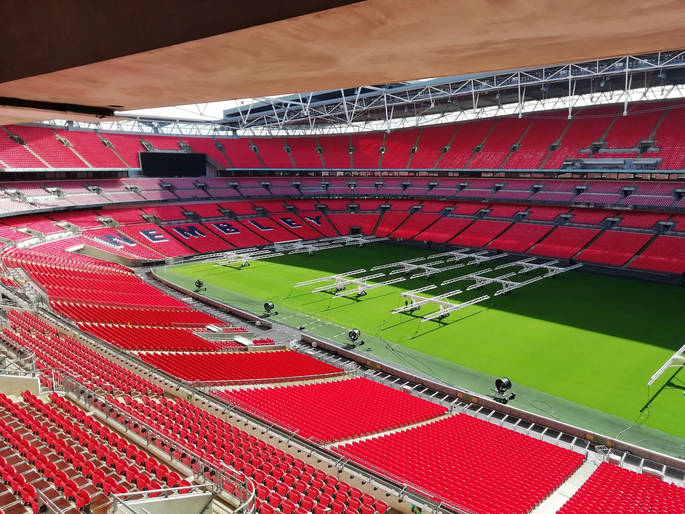
By Mick Baker, flickr
- Qualification (Group Stages) – Thursday 23rd March 2023 to Tuesday 21st November 2023
- Qualification (Play-Offs) – Thursday 21st March to Tuesday 26th March 2024
- Group Stages – Friday 14th June to Wednesday 26th June 2024
- Round of 16 – Saturday 29th June to Tuesday 2nd July 2024
- Quarter-Finals – Friday 5th & Saturday 6th July 2024
- Semi-Finals – Tuesday 9th & Wednesday 10th July 2024
- Final – Sunday 14th July 2024, kick-off TBC
This schedule is subject to alteration
About The European Championship
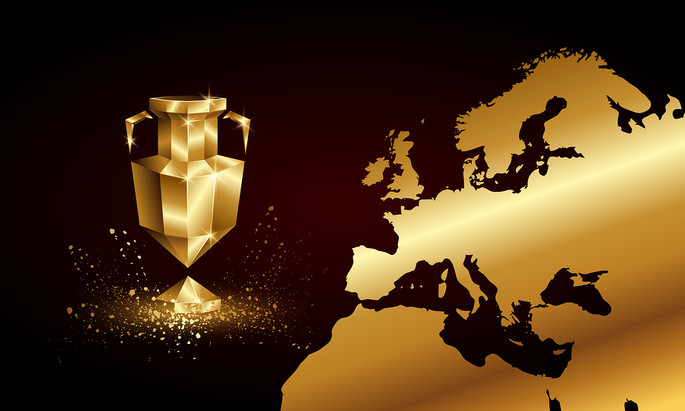
Like, the FIFA World Cup, the UEFA European Championship is hosted by a different country each year. A bidding process, not too dissimilar to that of World Cup or the Olympics, takes place before a panel of representatives from within UEFA then decides which country will be allocated the hosting rights for the competition.
As the tournament is held every four years, it obviously moves from country to country within this time frame. However, for the 2020 version of the competition the organisers have decided that for the first time ever it will take place across several countries, making it much more of a continental tournament rather than restricted to one place.
The majority of European leagues run from August through to May, and as a result the Euros tend to take place at the back of May, running through to early July.
The Creation of the Euros
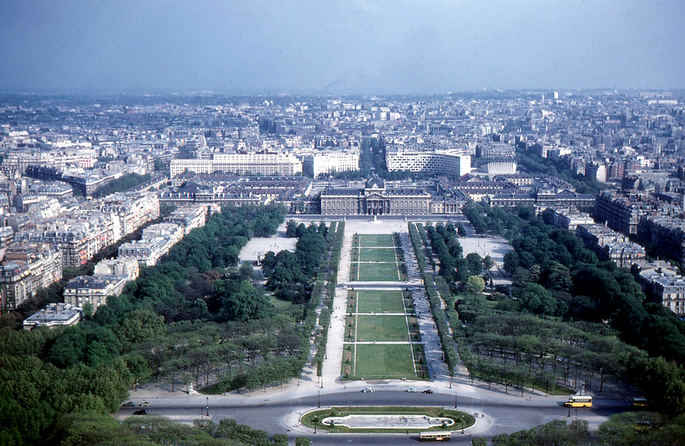
Champ de Mars, Paris, in 1960 by Roger W, flickr
It was Henri Delaunay of the French Football Federation who first made the suggestion for a pan-European football tournament. That was back in 1927, but the one-time Secretary General of the FFF wouldn’t live to see his idea become a reality. It wasn’t until 1958 that an idea similar to the one proposed by Delaunay began to take shape, with the Frenchman having died in 1955. Seventeen teams applied to take part in the knockout competition that at the time was given the name of the UEFA European Nations’ Cup, with each team playing at home and away from home in order to try and qualify for the final tournament.
It was the hosts France, Yugoslavia, Czechoslovakia and the Soviet Union that made it through to the semi-final stage, with the Soviets only making it there because the far-right dictator of Spain, Francisco Franco, refused to allow his players to travel to the Soviet Union after the Soviets had offered support to the Second Spanish Republic in the Spanish Civil War. It was the Soviets who went on to win the competition, thanks to the goalkeeping exploits of Lev Yashin and an extra-time goal from Viktor Ponedelnik to take the game away from Yugoslavia. Whilst the Soviets earned their win, it’s notable that the likes of England, West Germany and Italy didn’t even enter the tournament.
1960 UEFA European Championships
| Host | Participants | Winner | Runner-up | Final Venue |
|---|---|---|---|---|
| France | 4 | Soviet Union | Yugoslavia | Parc de Princes, Paris |
The Competition’s Development
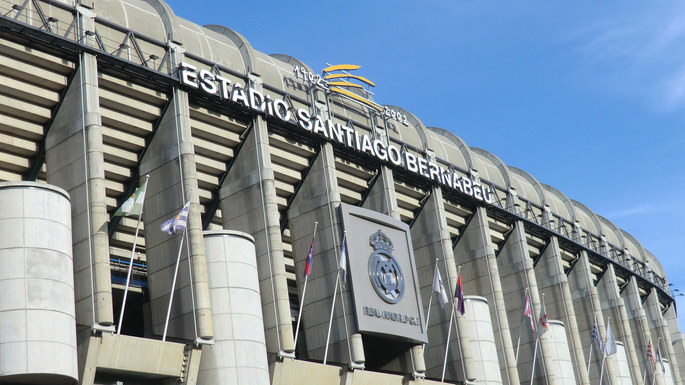
Estadio Santiago Bernabeau, Madrid, by Reinhard Link, flickr
Four years after its inaugural outing, the tournament moved to Spain and there was a huge increase in the number of teams applying to take part in it. There were still only four that played in the final stage, but twenty-nine nations entered in the first place. West Germany still didn’t participate, whilst Greece ended up withdrawing from the competition after being drawn to play against Albania, who they were at war with. Spain finally got their chance to find out how they might have got on if they’d played against the Soviet Union four years earlier, beating them 2-1 in the final at the Santiago Bernabéu.
1964 UEFA European Championships
| Host | Participants | Winner | Runner-up | Final Venue |
|---|---|---|---|---|
| Spain | 4 | Spain | Soviet Union | Santiago Bernabeu, Madrid |
Four years after that and the format remained largely unchanged, but the competition did feature something that hasn’t been used to decide the outcome of a match before or since. When Italy, who were the tournament’s hosts, and the Soviet Union couldn’t be separated during the semi-final stage, a coin toss was used to decide who would feature in the final. The last game of the Championship had to be replayed when Italy and Yugoslavia drew 1-1. Italy won the replay 2-0 to become the champions of Europe for the first time. It’s also noteworthy that thirty-one teams entered the competition in the first place, showing that it was becoming more and more popular throughout the continent.
1968 UEFA European Championships
| Host | Participants | Winner | Runner-up | Final Venue |
|---|---|---|---|---|
| Italy | 4 | Italy | Yugoslavia | Stadio Olimpico, Rome |
The Emergence Of The Germans
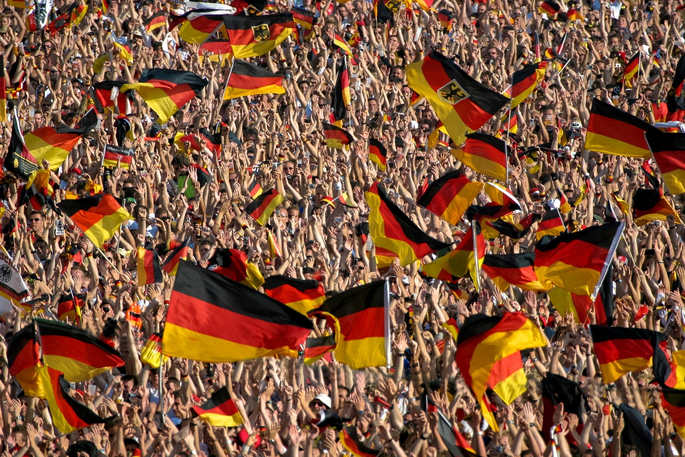
In 1972 the tournament was hosted by Belgium. Once again just four teams played in the final stages, with Belgium being joined by Hungary, the USSR and West Germany. Both extra-time and penalties were available for the referees to use in order to decide upon a match winner, though they were never needed as it happens. The German’s beat the hosts in one semi-final, whilst the Soviet Union scraped past Hungary courtesy of a 1-0 win. If anyone had been expecting a close encounter in the final then they were disappointed, with West Germany’s lack of experience not showing as they won 3-0.
1972 UEFA European Championships
| Host | Participants | Winner | Runner-up | Final Venue |
|---|---|---|---|---|
| Belgium | 4 | West Germany | Soviet Union | Heysel Stadium, Brussels |
If any football fans ever wonder about Germany’s experience on the international stage then the 1972 Euros might well be the country’s defining moment. They went on to with the World Cup two years later and the squad that did so had cut its teeth in the European Championship first. The West Germans also did well in the 1976 version of the competition, losing to Czechoslovakia in a penalty shootout in the final. It’s unusual to write about German’s losing a penalty shootout, which might help to explain why the man who scored the winning penalty had the type of goal he scored named after him. Antonín Panenka chipped the ball and the resulting goal was referred to by UEFA as ‘perhaps the most famous spot-kick of all time’.
1976 UEFA European Championships
| Host | Participants | Winner | Runner-up | Final Venue |
|---|---|---|---|---|
| Yugoslavia | 4 | Czechoslovakia | West Germany | Red Star Stadium, Belgrade |
The Competition’s Expansion
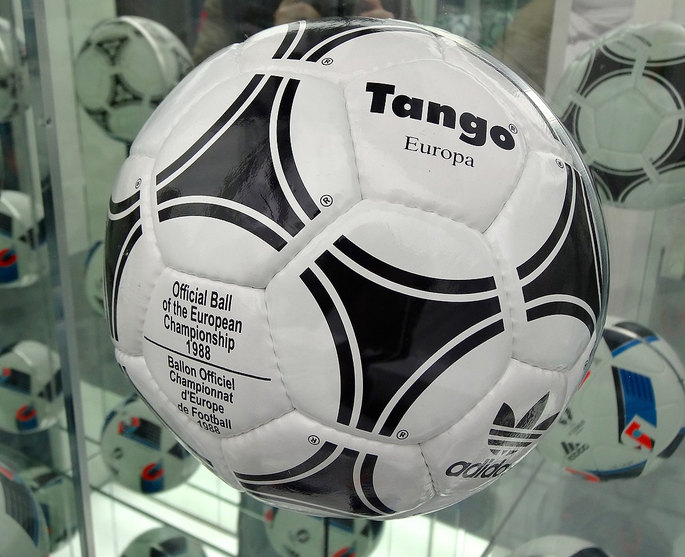
By Liondartois, Wikimedia Commons
The 1976 European Championship is remembered for two main reasons: it was the final one to feature just four teams in the competition proper and it was also the last one that required the host nation to go through qualifying. Italy were the hosts for the second time in 1980 and it was decided that the final stage would be expanded to include eight teams. The format required the use of a group stage for the first time in Euros history, with the eight participating teams split into two sets of four. They played a round-robin set of games against each other and the winners of the two groups advanced to the final. The runners-up, meanwhile, played in the third-place / fourth-place play-off match.
The final of the 1980 competition was held in the Stadio Olimpico in Rome and West Germany went up against Belgium. The winning goal was netted by Horst Hrubesch with just minutes of the match remaining, after the Belgians had equalised in the second-half.
1980 UEFA European Championships
| Host | Participants | Winner | Runner-up | Final Venue |
|---|---|---|---|---|
| Italy | 8 | West Germany | Belgium | Stadio Olimpico, Rome |
The eight team format remained in place in 1984 when France hosted and won the competition on home soil. Michel Platini, who would later go on to be the President of UEFA before leaving in disgrace, scored nine goals in five games for the hosts, one of which was the opener in the final against Spain. Though eight teams were involved, the actually way the tournament worked was slightly different, with the top two sides from the groups progressing to a knockout semi-final stage and no third-place play-off being played.
1984 UEFA European Championships
| Host | Participants | Winner | Runner-up | Final Venue |
|---|---|---|---|---|
| France | 8 | France | Spain | Parc de Princes, Paris |
Just two more tournaments involving eight teams were played, with the first one being hosted by West Germany in 1988. The hosts were knocked out in the semi-finals by their rivals the Netherlands, with the Dutch then going on to win the competition after they beat the USSR 2-0 in the final, hosted at the Olympia Stadion in Munich.
1988 UEFA European Championships
| Host | Participants | Winner | Runner-up | Final Venue |
|---|---|---|---|---|
| West Germany | 8 | Netherlands | Soviet Union | Olympiastadion, Munich |
Four years later and the competition kept its format of having two groups of four with the top two teams moving into the semi-finals, but the major headline from the tournament was that UEFA refused to allow the Socialist Federal Republic of Yugoslavia to take part because some of the states that made it up were at war with each other. A new name was added to the list of winners, however, when Denmark beat the now unified Germany 2-0 in the final.
1992 UEFA European Championships
| Host | Participants | Winner | Runner-up | Final Venue |
|---|---|---|---|---|
| Sweden | 8 | Denmark | Germany | Ullevi, Gothenburg |
The Move To Sixteen Teams
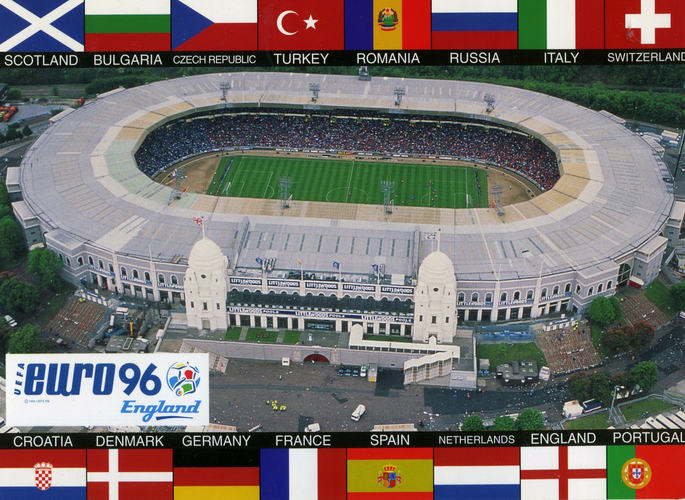
By Sludge G, flickr
Though we retrospectively refer to any version of the European Championship as a ‘Euros’, it was actually the 1996 iteration of the competition that used the nomenclature for the first time. It was also when the number of teams involved in the finals proper expanded from eight to sixteen. Though the format changed, the result didn’t – Euro ’96 was won by the unified Germany when they defeated the hosts England in the semi-finals and the newly created Czech Republic in the final. The win came thanks to a Golden Goal from Oliver Bierhoff, the first major tournament settled by the short-lived alternative to extra-time and penalties.
1996 UEFA European Championships
| Host | Participants | Winner | Runner-up | Final Venue |
|---|---|---|---|---|
| England | 16 | Germany | Czech Republic | Wembley Stadium, London |
Four years later and UEFA continued to experiment with what they were doing with the competition, allowing it to be co-hosted by two nations for the first time. The Netherlands and Belgium shared the honours, whilst the defending World Cup winners France managed to come from 1-0 down to beat Italy in extra-time in the final. It took a last-minute winner from Sylvain Wiltord to even get them into extra-time, before David Trezeguet popped up with the winner.
2000 UEFA European Championships
| Hosts | Participants | Winner | Runner-up | Final Venue |
|---|---|---|---|---|
| Belgium/Netherlands | 16 | France | Italy | De Kuip, Rotterdam |
If France had been entirely expected to win the tournament in 2000 then no one expected Greece to win it in 2004. After all, they’d only qualified for one World Cup and one European Championship before beating hosts Portugal 1-0 in the final.
2004 UEFA European Championships
| Host | Participants | Winner | Runner-up | Final Venue |
|---|---|---|---|---|
| Portugal | 16 | Greece | Portugal | Estadio da Luz, Lisbon |
Co-Hosting Continued
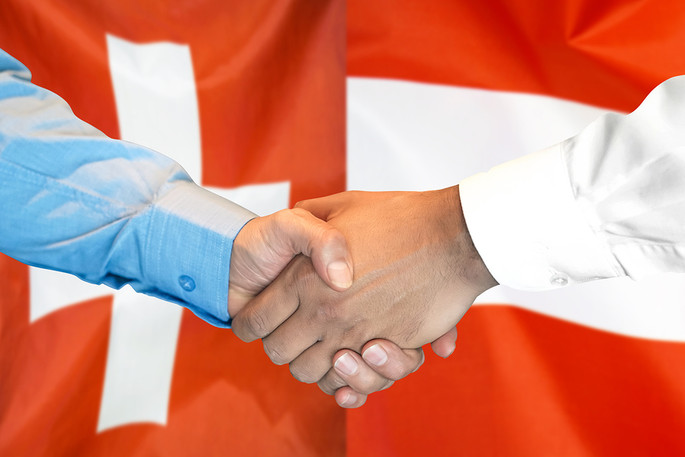
The success of Euro 2000 meant that UEFA chose to continue the idea of allowing two countries to host the tournament in both 2008 and 2012. The first one of the two was given to Austria and Switzerland, taking place in June 2008 and culminating in a final between Spain and Germany in Vienna’s Ernst Happel Stadion. Fernando Torres scored the only goal of the game and handed the Spanish their first major tournament victory since they won the same competition in 1964. Unlike Greece four years earlier, no one questioned whether or not Spain were deserving winners. As well as scoring more goals than any other team, Xavi was named the Player of the Tournament and the Team of the Tournament featured nine Spanish players.
2008 UEFA European Championships
| Hosts | Participants | Winner | Runner-up | Final Venue |
|---|---|---|---|---|
| Austria/Switzerland | 16 | Spain | Germany | Ernst-Happel-Stadion, Vienna |
In 2012 the European Championship was again co-hosted, this time by Poland and Ukraine. It was a tournament of numerous firsts, not least of which was the fact that Spain became the first nation to defend the title when they beat Italy 4-0 in the final. Fernando Torres also made the record books by scoring Spain’s third goal and becoming the first player to find the net in two different Euros finals. Spain were also the first team to win three back-to-back major tournaments, having been victorious in the World Cup in 2010. It was also a noteworthy year because a goal in the England v Ukraine game wasn’t given even though it crossed the line, leading to the FIFA President Sepp Blatter reversing his own anti-goal-line technology stance.
2012 UEFA European Championships
| Hosts | Participants | Winner | Runner-up | Final Venue |
|---|---|---|---|---|
| Poland/Ukraine | 16 | Spain | Italy | Olympic Stadium, Kiev |
The Move To Twenty-Four Teams
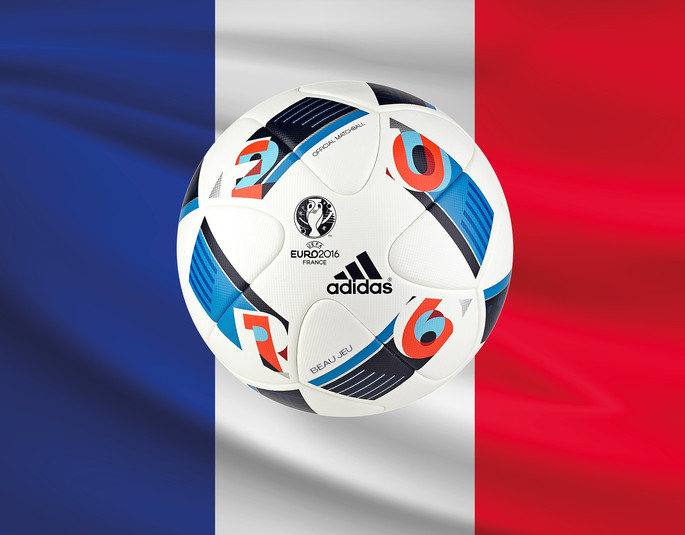
The Football Association of Ireland and the Scottish Football Association worked together in 2007 to propose to UEFA the idea that the European Championship should be expanded to allow twenty-four teams to take part in it rather than sixteen. Though England and Germany opposed the idea, the UEFA Executive Committee and its fifty-three members confirmed in 2008 that it would indeed be expanded, but not until 2016. In 2010 it was announced that France would host the tournament for the third time, which was fitting given that the French had hosted the first ever version of it and so would be hosting when it became the largest version of itself.
The France side was also tipped to do well in the tournament proper, with a talented side being roared on by the home crowd. Indeed, they reached the competition’s final and faced a Portugal team that had only made it out of the groups by finishing as one of the best third-placed teams. The game went to extra-time and, even though the country’s most famous player Cristiano Ronaldo limped off after twenty-five minutes, Portugal won 1-0 and lifted a major trophy for the first time in the country’s history.
2016 UEFA European Championships
| Host | Participants | Winner | Runner-up | Final Venue |
|---|---|---|---|---|
| France | 24 | Portugal | France | Stade de France, Paris |
Several countries applied to host the competition in 2020, but UEFA decided to spread the tournament across the continent instead. England reached the final at their home stadium of Wembley having won their group which contained Scotland, Croatia and the Czech Republic, defeating Germany, Ukraine and Denmark in the knockout rounds. They met Italy in the final who had beaten Wales, Turkey and Switzerland in their group stage, overcoming Austria, Belgium and Spain in the knockout stages.
England got off to the perfect start on home soil, with Luke Shaw putting the Three Lions ahead after just two minutes. The Gli Azzurri had to wait until the 67th minute to equalise when veteran defender Leonardo Bonucci bundled the ball across the line from short range. The score stayed at 1-1 through 90 minutes and extra time with the Italians holding their nerve to win the penalty shootout 3-2 and secure their second European Championship.
2020 UEFA European Championships
| Host | Participants | Winner | Runner-up | Final Venue |
|---|---|---|---|---|
| Various | 24 | Italy | England | Wembley Stadium, London |
Tournament Format
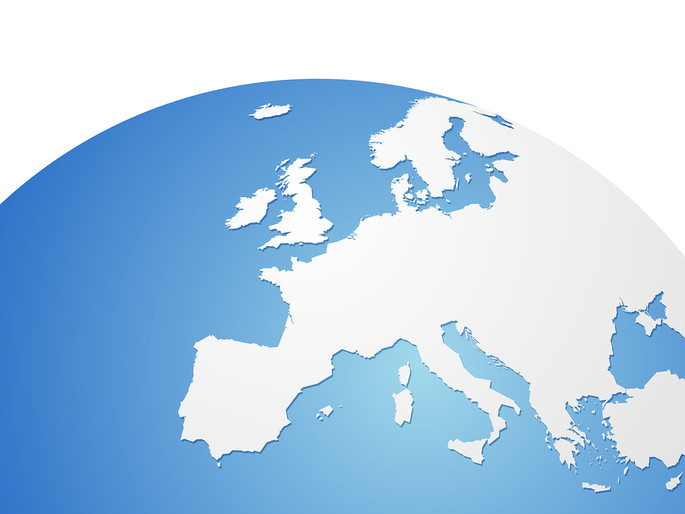
The qualifying period for the tournament is made up of nine groups, selected by a seeding process based on World Rankings. The winners and the runners-up from each group will automatically qualify, as does the host nation. The best placed third place team from all of the groups also gets a spot before the remaining 8 teams go into a knockout stage to determine the final four qualifying countries.
For the tournament proper the twenty-four competing teams are separated into six groups, with four teams in each group. The teams play each side in their group once before the six group winners and six runners-up move forward into the last sixteen phase, joined by the four best third-placed teams according to points and goals scored. It then becomes a knockout tournament, with extra-time and penalties being used if necessary in order to see which teams will advance to the final.
Interesting facts
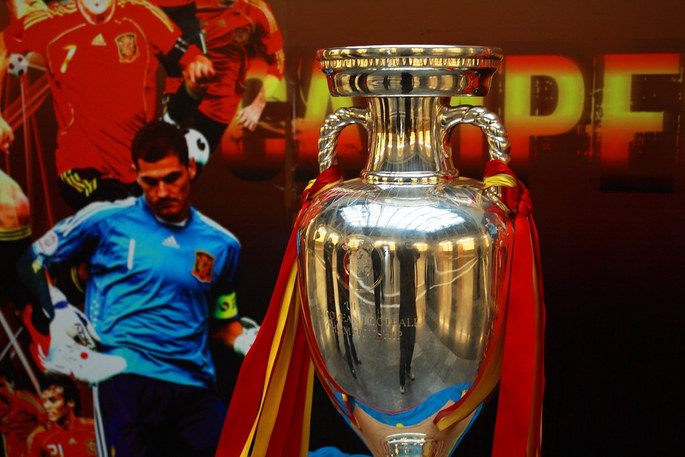
By Álvaro Millán, flickr
Given that the European Championship was first played in 1960, it should come as no surprise whatsoever that there are a number of interesting facts that you might want to know about. Here’s a look at the best of them:
- Spain and Germany are the two most successful teams throughout Euros history, winning the tournament three times apiece
- Germany have also had the most runner-up finishes with three, tying that of the then Soviet Union
- No team has played in more finals than Germany who have enjoyed six appearances since the tournament began
- Interestingly, England have finished in the top-eight eight times, only ever progressing past the semi-finals once, at Euro 2020
- Thirteen players have won the tournament twice, with none doing so a third time. Rainer Bonhof managed it with West Germany and has the most individual medals in the tournament with three (two winners and one runners-up)
- The youngest player to have played in the Euros was Jetro Willems from the Netherlands, making his debut against Denmark in 2012
- The oldest is Lothar Matthaus from Germany, who played until he was thirty-nine-years-old
- Michel Platini holds the record for the most goals in one tournament with nine, whilst Robbie Keane has the most goals throughout the qualifying phase with a staggering twenty-three
- Combined, Cristiano Ronaldo holds the record for goals in both qualifying and the finals after finding the net 45 times to date
- Eight players have scored hat-tricks in the Euros and the current record number of goals in the final itself stand at two, scored by Fernando Torres
- Two players, Alan Shearer and Zlatin Ibrahimovic, have scored six consecutive goals in Euro finals matches
- The highest attendance ever recorded stands at 79,115 when the Soviet Union played Spain in 1964 at the Santiago Bernabeu Stadium in Madrid, Spain
